World Cup goalkeeper Jim Platt swaps pitch for politics
- Published
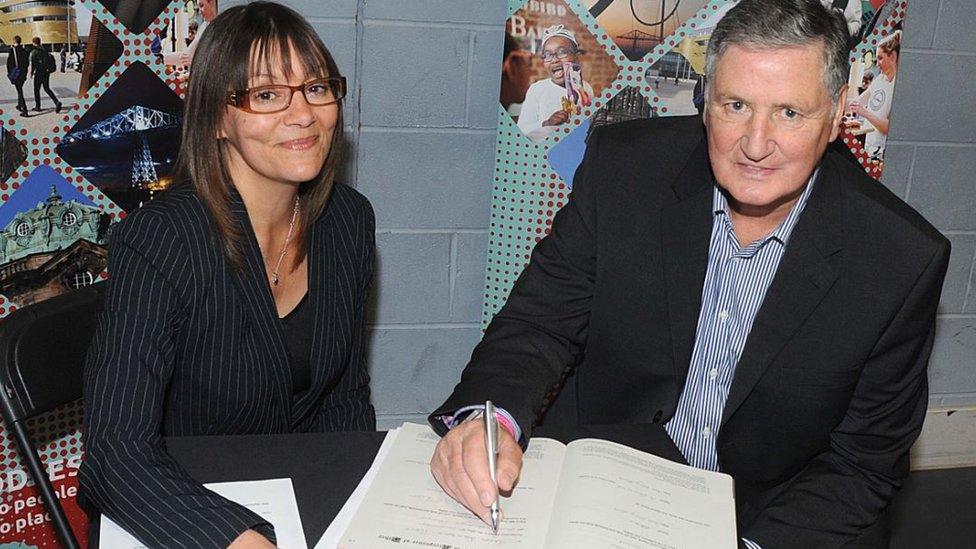
Jim Platt (right) signs the declaration of the acceptance of office in the company of Middlesbrough Council's head of legal services, Samantha Dorchell, following his election
Former Middlesbrough FC and Northern Ireland international goalkeeper Jim Platt has never been one to let the grass grow under his feet.
Renowned for stopping shots, he once bagged a hat-trick as a centre-forward for Middlesbrough's reserves against Lincoln City.
Platt's football coaching skills were later honed during managerial spells with clubs including Darlington, Assyriska of Sweden, and Irish league sides Ballymena United and Coleraine.
But now he has swapped the pitch for the political arena, after being elected to Middlesbrough Council as an independent.
"In the past, when I was driving through Middlesbrough, politics never entered my head," he said.
"I am now looking at things like grass verges and their length, and considering matters such as planning as well as children's social care."
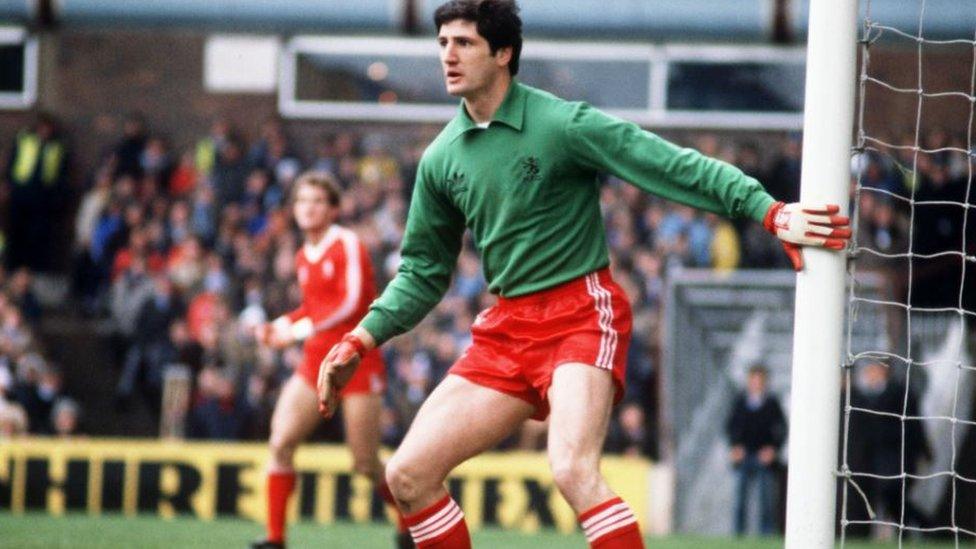
The goalkeeper made more than 400 appearances for Middlesbrough FC after signing for them as a teenager
Platt is not the first football goalkeeper in the UK to have served as a local councillor, with former Glasgow Celtic custodian Ronnie Simpson and ex-Burnley net-minder Albert Sanderson among those beating him to the punch.
He secured 970 votes to be elected for the Kader ward in May, and explained why he had decided to embark on a political role.
"As a councillor I only want to help make Middlesbrough a better place to live," he said.
"Being a councillor is much more difficult than I thought it would have been, it takes up a lot more time than I thought.
"I was asked a few times to stand and that kept happening until I gave in, they wanted to get more independents on the council.
"I have retired and I have spare time, so I decided to give it a go for four years."
Ascent to the top
Platt said Middlesbrough has changed "dramatically" as a town since he arrived from Ballymena United as an 18-year-old, fresh from playing in an Irish Cup final.
"My first vision of coming off the train when I arrived was that it was very industrialised, but once I got out and about it was a nice place to be," he said.
"I was homesick the first year I was here, but I wanted to be a footballer and the nervousness wore off.
"The first year was a disaster, I was always getting the boat home from Stranraer and it was a five-hour drive there in those days.
"The stadium that I played in, Ayresome Park, is no longer there and Middlesbrough have a new stadium.
"There are more people in the area now and the population is more diverse."
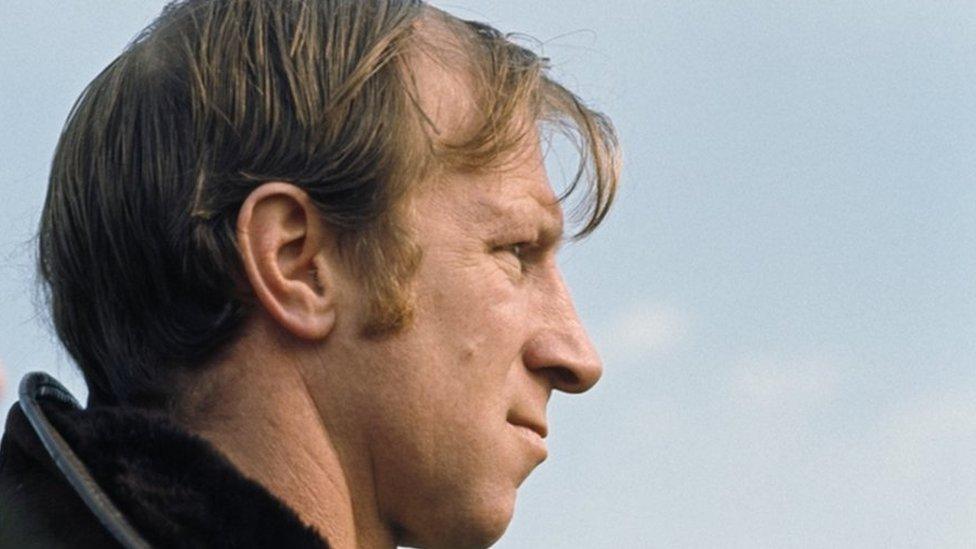
He says Jack Charlton, who coached him at Middlesbrough in the 1970s, was the best football manager he played for
Platt, who trained with Bill Shankly's Liverpool as a teenager, made more than 400 appearances for Middlesbrough and worked under various managers including Stan Anderson, Jack Charlton and Malcolm Allison.
He hails the club's promotion to the Football League First Division in 1973-74 under Charlton's stewardship as one of his career highlights.
"Jack Charlton was the best manager I worked under, he took us up to the first division which was the top flight then," he said.
"He was good to work with and we had a successful team, I always say if he had bought us a centre-forward, we could have won the top division.
"I remember we beat Liverpool at Anfield in the League Cup, it was a wonderful ground to play at and they clapped you.
"I saved a penalty in the League Cup at the Kop end - those were the days when Liverpool dominated."
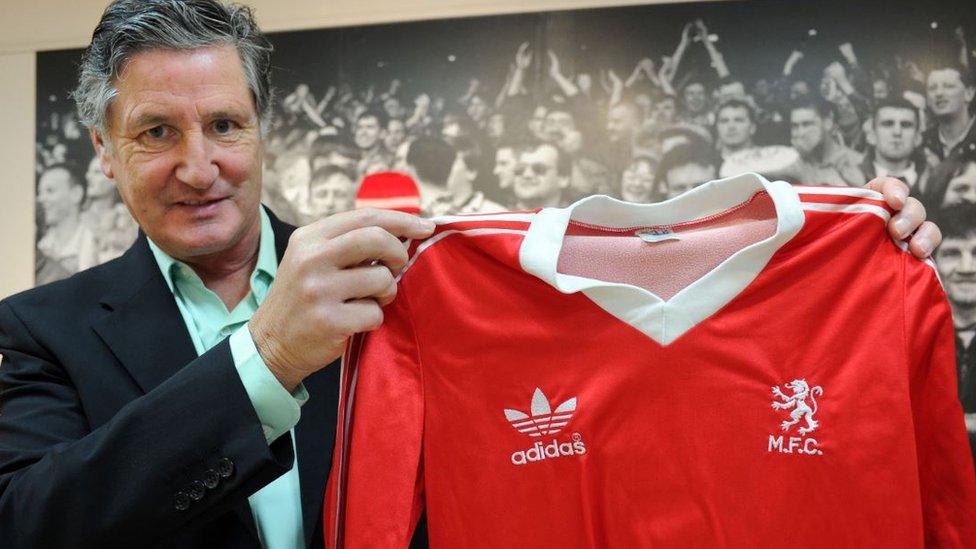
Platt with the shirt George Best wore during his testimonial game in 1981
Middlesbrough rewarded Platt for his long service with a testimonial against Sunderland in 1981 which featured Manchester United and Northern Ireland legend George Best.
"George Best played in a lot of testimonials, he made people a lot of money and was a great player," he said.
"Everyone wanted to see him, he was the best in the world."
That was a year after Platt had starred for Northern Ireland as they clinched the 1980 British Home Championship, a rare chance to shine during an international career where he competed for the number one shirt with his country's record cap holder Pat Jennings.
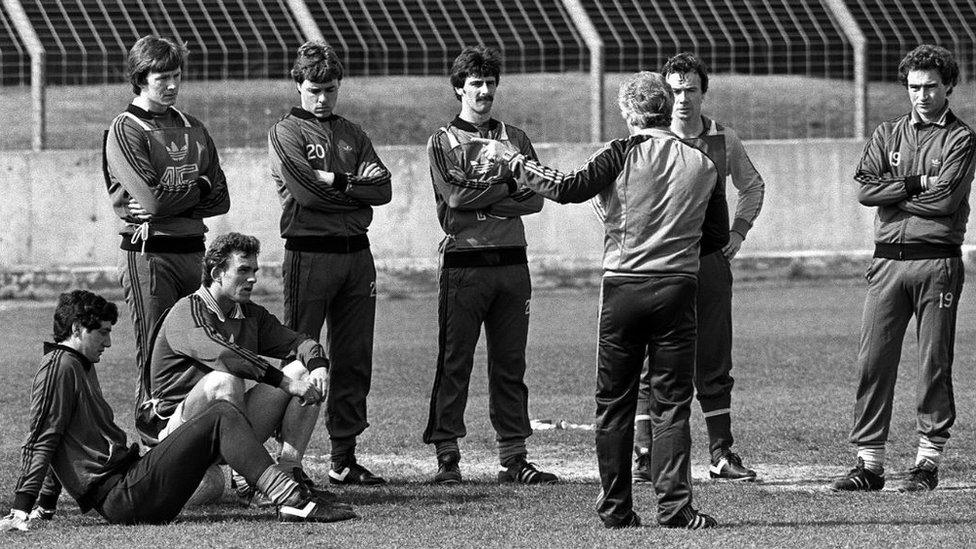
Jim Platt (far left sitting down) and various members of the Northern Ireland squad receive instructions during a training session
Another opportunity arose when he lined out for Northern Ireland in their 2-2 draw against Austria in the second stage of the 1982 World Cup finals in Spain.
"Qualifying for the World Cups in 1982 and 1986, for Northern Ireland and the players that was the pinnacle," he said.
After returning to Northern Ireland for a spell at Ballymena where he won the Irish Cup in 1984, he moved to his hometown club Coleraine.
He was following a family tradition, with his father Howard, and brothers John and Davy, having played for the club.
"I was approached by (former Glasgow Celtic and Northern Ireland player) Bertie Peacock," he added.
"I was quite successful at Coleraine, we were runners-up to Linfield in the league three years running, they had more money and it was impossible to compete with them."
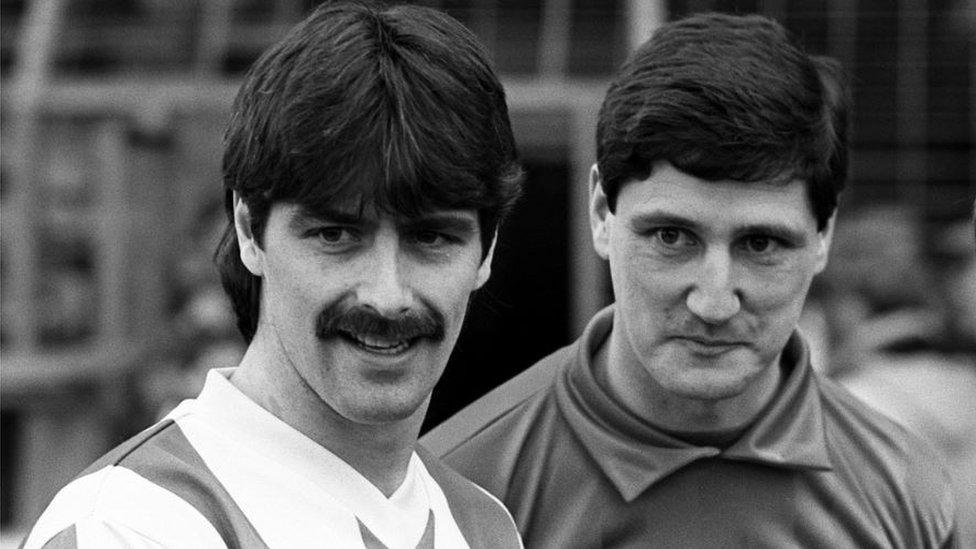
Platt standing beside midfielder Felix Healy (left) when he was in charge of Irish league side Coleraine
Platt had various coaching roles after Coleraine, including a period with Darlington who he steered to the 1996 Football League Third Division play-off final which they lost to Plymouth Argyle.
These days, the 67-year-old maintains his connection with Middlesbrough FC as an ambassador in the club's hospitality suites on match days.
Millions of pounds now swirl around the modern game, and Platt believes there should be a better distribution of wealth between the richer and poorer clubs - a point made even starker by the recent expulsion of Bury from the English Football League following financial difficulties.
"There is too much money in the game today," he said.
"Players only have to play a few games a season now to be millionaires.
"I don't think it is good for people's personalities.
"I do think there's too much money at the top end of the game and not enough at the bottom end."